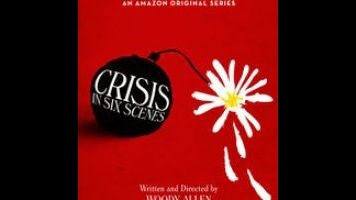It’s clear by now that Crisis In Six Scenes is something of a misnomer. This mini-series/overlong movie/whatever is broken into six episodes, but each one has multiple scenes; the episodes don’t even have a particularly limited frame that would qualify them as de facto scenes (though each one seems to take place over roughly 12 to 24 hours). But the title is appropriate in that the show does rise and fall by its scenes, with good ones bumping up against awkward, perfunctory, or half-assed ones.
As it happens, the fourth episode does contain about six scenes during its briskly paced but ultimately mild 22-ish minutes. They are, not in this order: Two flirty-to-romantic scenes between Lenny and Alan; two scenes where Sid and Kay argue about Lenny before she turns up and interrupts; a scene with Kay’s book club; and a scene between Alan and his fiancée Ellie. The later scenes with Alan are mostly shoe-leather plot stuff disguised as emotional underpinnings, and the scenes between Sid and Kay only get a boost when Lenny shows up in them at the tail end. Even then, Allen doesn’t supply much in the way of provisions for his talented cast; May and Cyrus don’t get nearly enough zingers (or even the kind of straight-woman lines that sometimes get better laughs in Allen’s movies based on the performer’s delivery). That leaves two good scenes: the first scene between Lenny and Alan, and the peek at Kay’s book club.
The book club scene, while not exactly cutting edge, is an example of what Allen has done best with this show: use a protracted running time to let little comic ideas percolate a few minutes longer than they might in his feature films. Here, little old ladies who have read Chairman Mao quotations for their book club gradually make their way to planning a draft-board protest, with straight-faced discussions of nudity and pig’s blood. There’s a sincere affection to the way Allen portrays these women; he’s poking fun at the incongruity of them getting fired up for a protest, sure, but their approach is so open-minded that they’re not really objects of satire. (If anything, they’re more open to new experiences than his Sid.)
That Allen can put together an amusing four-minute comedy bit is not especially surprising. But I was surprised by how much I liked the opening sequence of the episode, where Lenny and Alan spend some time together outdoors. For the most part, their blossoming relationship is overly mechanical, even clinical, in that weird Woody Allen way where the guy tends to just make his intentions known to the girl, and then she decides whether she accepts them or not, sometimes after some nagging on his part. That’s more or less what’s happening here, but as with his recent film Café Society, some poignancy seeps into it anyway, in part due to the way Allen shoots his actors with such warm tones.
Cyrus is totally in hippie drag at this point, but damned if she isn’t affecting when she talks about her ideals. Allen is always happy to put too fine a point on something, so of course Alan tells her that she’s “charismatic.” But it’s not untrue, and John Magaro does a decent job looking moony-eyed opposite Cyrus’s sureness. Later, when Sid subsequently brings up the idea that Alan staying with them was supposed to protect and insulate him from the world, the show happens upon its hook in an oddly blasé manner, 70something minutes into this project: The notion of a young guy trying to stay away from radical influences of Washington Square Park but finding radicalism in the suburbs anyway is a neat one. Whether this is something Allen will actually develop in the final stretch is starting to seem unlikely. At this point, I’m hoping for at least six good scenes in total.
Stray observations:
- I’m enjoying Sid’s ongoing irritation at Lenny’s appetite, and her disdain for his feelings that she should not be eating his food. When he protests that she ate his leftover Chinese food, her response that he shouldn’t be eating that stuff at his age, but rather “put crackers in a bowl of warm milk,” might have been the biggest laugh of the series so far for me.
- I also like that when Alan mentions Sid, Lenny’s response is a seemingly genuine “who?!”
- I wish the character-actor running gag had been picked up again before the fourth episode, but it was still satisfying to add another non-glamorous actor added to the list of people Sid’s haircut makes him resemble. This time it’s the ever-scheming Peter Lorre, or as I think of him, the Steve Buscemi of yesterday. (Although: I saw Steve Buscemi at a Q&A once, and he’s somewhat more dapper in person.)
- This episode’s ghosts of Woody Allen movies past: Lenny describes a “psychosomatic” condition that brings to mind the psychosomatic blindness experienced by Allen’s character in Hollywood Ending; Allen offers advice to a youthful doppelganger just like he did in Anything Else. It’s not a great sign when the Allen movies that inevitably come to mind during this series tend to all be from his post-2000 period, though I have an affection for the utterly misbegotten Anything Else. It’s perhaps a peak example of Allen’s out-of-touch writing (wherein Jason Biggs plays a college-aged man who is married, lives on the Upper East Side, prefers jazz to any other type of music, and, of course, is already well into “analysis”), but it’s the first movie where Allen had an inkling that he might move himself into a supporting role in his own movie, and his performance as Biggs’s unhinged mentor is very funny.










![Rob Reiner's son booked for murder amid homicide investigation [Updated]](https://img.pastemagazine.com/wp-content/avuploads/2025/12/15131025/MixCollage-15-Dec-2025-01-10-PM-9121.jpg)

























![HBO teases new Euphoria, Larry David, and much more in 2026 sizzle reel [Updated]](https://img.pastemagazine.com/wp-content/avuploads/2025/12/12100344/MixCollage-12-Dec-2025-09-56-AM-9137.jpg)




